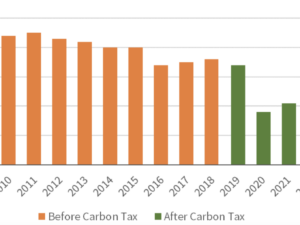By Dr. Danny Richter, CCL VP of Government Affairs
This month, CCL volunteers across the country are gearing up for our annual June conference and lobbying push. For years, we’ve been meeting with congressional offices to educate them about carbon pricing and ask for their support. This year, we’re pushing that message even harder, backed by momentum from the international community, American businesses, and from within Congress itself.
Let’s take a look at some of the information our volunteers will be sharing with Senate and House offices later this month. You can find this info on our “Primary Ask” handouts, organized based on the political party and the congressional chamber you’re meeting with (e.g. Senate Republican, House Democrat, and so on). Also, check out my recent training where I discuss these ideas in depth:
Keep America competitive
Did you know the United States and Australia are the only Developed Economies without a carbon price in place? It’s true, and we’re going to make sure Congress knows it.
Our biggest trading partner (Canada) and the largest foreign market available to U.S. producers (the European Union single market) are seriously considering how to impose Carbon Border Adjustment Mechanisms (CBAMs) on their existing carbon prices just as those prices are climbing rapidly. The EU carbon price is now setting record highs and Canada’s carbon price is scheduled to increase to $130 U.S. dollars by 2030.
These moves have directly incentivized other large economies to either speed the implementation of their current carbon price (China) or to consider implementing a carbon price of their own (Russia). In our lobby meetings this month, we’ll ask representatives and senators to keep America competitive by implementing a carbon price of our own.
Here’s a CCL Laser Talk about “Carbon Pricing Around the World” so you can practice making this argument in a compelling way.
American businesses want to compete
This growing global trend toward accountability for carbon emissions actually creates an opportunity for America. If we place a transparent, explicit price on carbon, we can capitalize on our existing competitive advantage. Our production processes are already quite clean relative to the rest of the world.
This may be why, over the past year, American businesses have been coming out in droves to support market-based climate solutions (which include carbon prices) and a carbon price explicitly. The U.S. Chamber of Commerce, the Business Roundtable, the American Petroleum Institute, the International Institute of Finance, the American Chemistry Council, and the National Ocean Industries Association have all issued such statements, in addition to thousands of small and medium sized businesses throughout the country. American business wants to be able to compete on a level playing field with the rest of the world, and we’ll ask Congress to respond by putting a price on carbon.
Support a bill to price carbon
We want congressional offices to know that there are already several bills available to put a transparent, explicit price on carbon. There’s the America’s Clean Future Fund Act of 2021 (S. 685) and the American Opportunity Carbon Fee Act of 2019 (S. 1128; 116th) in the Senate, and the Energy Innovation and Carbon Dividend Act (H.R. 2307) in the House. During our lobby meetings, we’ll be asking some offices to step up and cosponsor those bills. (Dozens of their colleagues already have!)
For the offices who have already cosponsored carbon pricing bills, we’ll ask them to get vocal about their support for carbon pricing: in committee hearings, in conversations with colleagues, at appearances in their districts, and so on.
Attend the conference and help push for a price
I hope to see you at our June conference on the 12th! Register here to join us.
Then, you can connect with your local chapter to find out if you can plug into a lobby meeting this month or in the future to help us push for a price on carbon.






